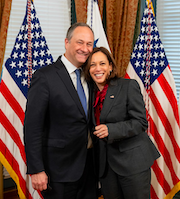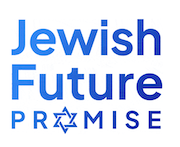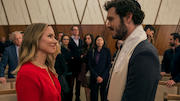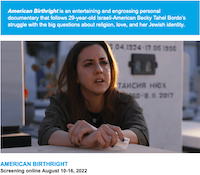Nobody Wants This
The news this month was pretty much all about the Netflix hit show, Nobody Wants This, in which “hot rabbi” Noah falls for Joanne who’s not Jewish; she says she’ll convert then realizes she’s not ready; he appears to choose to stay with her which means he won’t get the promotion to senior rabbi he’s always wanted.
The Forward published my take on it, What “Nobody Wants This” gets wrong about interfaith relationships today. I enjoyed watching the show. It depicts some aspects of Jewish life in a refreshing, positive way, while it’s portrayal of Jewish women is awful.
But the messaging about interfaith relationships is terrible. It suggests that nobody in the Jewish community wants interfaith relationships; that they don’t produce Jewish children; and that if the partner from a different faith background doesn’t convert, the Jewish partner will lose their Jewish identity (or in Rabbi Noah’s case, his dream to be senior rabbi).
While all of that is wrong, the show’s exaggerations do reflect an underlying reality – many interfaith couples do not feel a sense of belonging to the Jewish people, because of lingering negative attitudes about interfaith marriage. I’m hoping that Season Two will change the messaging and show a happy interfaith family raising children with Judaism; with Rabbi Noah becoming senior rabbi at a congregation that accepts him as intermarried; and perhaps even with Joanne taking an Introduction to Judaism course, whether or not it leads to conversion right away.
In a NY Times interview, the show’s co-producer, Sara Foster, says that “to draw an audience in for 10 episodes you need conflict.” I get that, and maybe what I’m hoping for doesn’t provide that. But given the messaging about interfaith marriage, let alone the stereotyping of Jewish women, it seems tone-deaf to me when her sister Erin Foster, the show’s writer and co-producer, says she feels fortunate to have shined “a positive light on Judaism and Jewish people and Jewish culture.” I feel the same way about Sara’s statement that “for there to be a Jewish romantic comedy that is number one across the world… is good for Jewish people.”
I tried to keep track of all of the writing about the show but can’t report on everything, let alone all the social media buzz. A Canadian academin, Celia Rothenberg, thinks that the stereotypes and depiction of interfaith marriage is harmful. I especially like Rabbi Denise Handlarski’s piece, in Hey Alma, I’m a Rabbi in an Interfaith Marriage — Here’s What I Think About ‘Nobody Wants This’; Lior Zaltman’s piece in Kveller, Should Jews Want Netflix’s ‘Nobody Wants This?’; Jessica Radloff’s piece in Glamour, Netflix’s Nobody Wants This and the Persistent Jewish Stereotype; and Keren McGinity’s piece in JTA, Netflix’s ‘Nobody Wants This’ casually celebrates Judaism. I want a second season.
There were other pieces in the NY Times and Time and Moment; an interview in the LA Times with and a profile of Erin Foster and her response to criticism of the show; a piece by Samira Mehta that puts the show in the context of past plays and movies featuring Jewish men dating women from different faith backgrounds; Rabbi Talia Kaplan explains “Why the charming ‘hot’ rabbi in ‘Nobody Wants This’ is bad for clergy and congregants everywhere”; an interesting podcast on the show with Conservative rabbis Michael Knopf and Jesse Olitzky; a piece by a British Reform rabbi; even a piece from Australia. Susan Katz Miller reasonably asked why Joanne had to be someone who is an ex-Christian (as opposed to from some other religious background) while “her people” – people who are practicing two faiths in an interfaith relationship – are never represented; she also objected to the pressure on Joanne to convert.
There were even commentaries from the Orthodox community. In a piece on Aish, a Jewish matchmaker says, not in an offensive way, that love cannot conquer all and that marrying within the faith is a foundational value that enriches our lives and communities.
But a piece in Jew In The City, by Allison Josephs, is offensive. She among other things refers to intermarriage as a “cardinal sin” that “leads to the extinction of the Jewish people” and says the non-Orthodox community is “marrying itself out of existence.” She says Rabbi Noah, by choosing Joanne, “becomes part of the extinction of the Jewish people.” Jew In The City describes itself as a nonprofit “dedicated to changing negative perceptions of religious Jews and making engaging and meaningful Orthodox Judaism known and accessible. This is achieved by highlighting an approach based on kindness, tolerance, sincerity, and critical thinking.” Tolerance?
Conservative Movement News
Just as this newsletter was about to be sent, a powerful essay appeared on Mark Hoffman’s Times of Israel blog: Too Little, Too Late for Conservative Judaism? Hoffman describes the movement’s recent efforts to reassess its approach to interfaith marriage, and discusses a very interesting-sounding presentation by Rabbi Aaron Brusso that I haven’t had a chance to fully watch yet. I’ll plan to comment more in the November email newsletter.
In Other News
This profile of Alexandra Meyer, tells about a young woman who grew up in an interfaith family, with a Jewish mother, with no synagogue or camp or bat mitzvah, who built a Jewish life through her own exploration as a late teen and in college, and is now the managing director of GatherDC, a nonprofit that helps young adult Jews connect to Jewish life and to each other.

 Tamkin quotes Rabbi Lex Rofeberg as saying that HUC’s decision to admit rabbinic students in interfaith relationships was “a bigger deal” than Emhoff’s convention speech, because it counters the way interfaith relationships are besieged or attacked in Jewish spaces. Andrew Rehfeld is then quoted as saying that the new policy is recognition of a shift in American Jewish life with many interfaith families deeply engaged. He makes the point, echoed by the USCJ’s Keren McGinity, that partners from different faith backgrounds can result in deeper commitments from their Jewish partners.
Tamkin quotes Rabbi Lex Rofeberg as saying that HUC’s decision to admit rabbinic students in interfaith relationships was “a bigger deal” than Emhoff’s convention speech, because it counters the way interfaith relationships are besieged or attacked in Jewish spaces. Andrew Rehfeld is then quoted as saying that the new policy is recognition of a shift in American Jewish life with many interfaith families deeply engaged. He makes the point, echoed by the USCJ’s Keren McGinity, that partners from different faith backgrounds can result in deeper commitments from their Jewish partners. Hadara Ishak, president of the
Hadara Ishak, president of the  The just released Netflix series, “Nobody Wants This,” about a “hot” rabbi played by Adam Brody, dating a woman who’s not Jewish played by Kristen Bell, is getting a lot of attention. Benyamin Cohen wrote a nice
The just released Netflix series, “Nobody Wants This,” about a “hot” rabbi played by Adam Brody, dating a woman who’s not Jewish played by Kristen Bell, is getting a lot of attention. Benyamin Cohen wrote a nice  Becky’s journey is prompted by her sister marrying a partner from a different faith background, the first time that has happened in their family. That part of the movie, that trashes interfaith marriage, is not fine. While there are some contrary voices, the overwhelming message that comes through is that intermarriage is a “time bomb,” it threatens the survival of the Jewish people, one who intermarries “cuts the chain,” a Jew has to be separate, the children of intermarriage won’t be Jewish. One rabbi intimates that Becky’s sister really isn’t of a different religion than her fiancée, because of her lack of Jewish practice.
Becky’s journey is prompted by her sister marrying a partner from a different faith background, the first time that has happened in their family. That part of the movie, that trashes interfaith marriage, is not fine. While there are some contrary voices, the overwhelming message that comes through is that intermarriage is a “time bomb,” it threatens the survival of the Jewish people, one who intermarries “cuts the chain,” a Jew has to be separate, the children of intermarriage won’t be Jewish. One rabbi intimates that Becky’s sister really isn’t of a different religion than her fiancée, because of her lack of Jewish practice. The hosts interview two Reform rabbis in Canada, Rabbi Lily Kowalski of Temple Emanu-El-Beth Sholom in Montreal, and Rabbi Philip Bregman, rabbi emeritus at Temple Sholom in Vancouver, to “tackle the big questions, including whether an interfaith wedding can be truly Jewish, how parents in interfaith relationships can instill Judaism in their children’s lives, and whether interfaith marriages might well spell the end of Judaism—or actually save us.”
The hosts interview two Reform rabbis in Canada, Rabbi Lily Kowalski of Temple Emanu-El-Beth Sholom in Montreal, and Rabbi Philip Bregman, rabbi emeritus at Temple Sholom in Vancouver, to “tackle the big questions, including whether an interfaith wedding can be truly Jewish, how parents in interfaith relationships can instill Judaism in their children’s lives, and whether interfaith marriages might well spell the end of Judaism—or actually save us.”